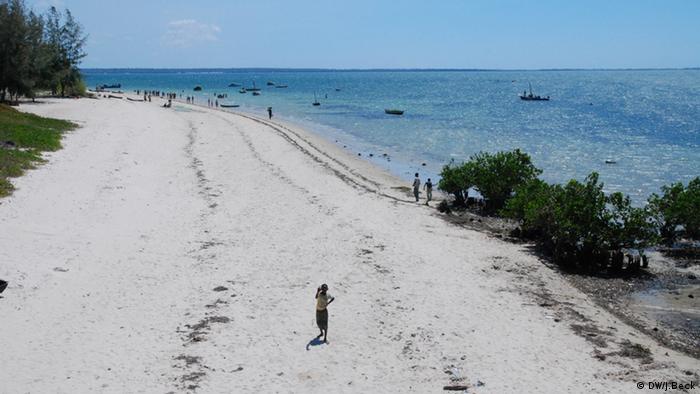Architectural changes could jeopardise Mozambique Island’s UNESCO status, government warns
Island of Mozambique at risk of disappearing

DW / Beach on the Island of Mozambique
A World Heritage Site since 1991, the Island of Mozambique is in danger of disappearing. Rising oceans related to climate change may one day leave it on the seabed. But for now the historic island city still plays hosts to many tourists, some of whom fall in love with the island and never return to home.
It was the first capital of Mozambique until 1898, when Maputo in the south of the country took over. Today, the Island of Mozambique is famous for its historical and cultural heritage. Nearly 15,000 people live on the three-kilometre-long island off the coast of the northern province of Nampula.
The island is crumbling
But its future is at stake. The island is already collapsing because of climate change. High tides invade the city, wreaking havoc on the access roads and in the houses, and coastal erosion has also increased, with climate change among the main factors.
So far about 300 metres of the island, and more than 500 metres of the mainland have been lost to erosion. The City Council needs more than US$3 million to protect it further.
“We have a part of the counter-coast wall eroded due to rising sea level. Also, the Lumbo area, which is also part of the municipality, is disappearing. As well as the fortress zone and the pool area on the island itself, which is very worrying” Island of Mozambique mayor Saíde Amur Gimba says.

The Nampula provincial government says that the situation on the Island of Mozambique is not unique in the province. According to Omar Aquiamundo, deputy provincial director of Culture and Tourism, there are several other islands that may disappear “due to global warming factors”.
Compared to them, the island of Mozambique is in a more advantageous situation, since it has “a restoration and control office”, he says. “There are concrete projects aimed at protecting the island itself. And there are many international organizations, like UNESCO, looking out for it,” he adds.
Mayor Gimba says that there are already solutions in sight. “On the island, we have PRODEMO [Project for the Development of Municipalities] financing for an extension valued at 2.5 million meticais. This area is not very critical, but we are going to do it for prevention. These are big numbers, more than US$1.5 million dollars,” he explains.

The importance of architecture preservation
The Island of Mozambique’s architectural and cultural heritage is what made it a UNESCO World Heritage Site in 1991, but according to inhabitants contacted by DW Africa, the preservation of architecture is no longer observed when it comes to building or rehabilitating houses.
Genito Molava is 27 years old and was born on this island where he still lives. The UNESCO official tourist guide is concerned, saying that “entrepreneurs and rich people who think that money is everything, do what they want. Sometimes they lack respect, even where great respect is demanded. There have been great problems of deviation of the artificial heritage in the construction of some houses, others were constructed, others changed,” he says.
Mayor Gimba agrees that architectural changes are not allowed, and improvements only as long as they do not “extinguish” typical features. “Ilha de Moçambique is a heritage site, so no changes are allowed. We have a regulation of levels of buildings to consider: category A buildings, which cannot be changed inside or out; B, which cannot be changed outside, but can be altered inside; category C, where can be changed completely inside, and category D that can be changed inside and outside.”

Disrespect in the “city of macuti”
The Island of Mozambique is already divided into two parts: the “city of stone and lime” and the “city of macuti”. The first houses the main monuments and conserved buildings; the second the informal dwellings roved with macuti – coconut palm leaves.
Mayor Gimba admits that some norms are not observed in the city of macuti, but attributes the situation to the lack of the raw material, in short supply as a result of climate change. “As everyone knows, there is a shortage of macuti because of coconut disease, and people are not going to lose their homes because of this,” he explains.
Five years ago, Ilha de Moçambique was one of the cities in Nampula province known for its lack of latrines, and this affected tourism. Now, however, the situation is better.
Mariamo Cebola, 44, who lives on the island, is pleased with the progress. “The municipality advises everyone to use the toilets, but there are still people who defecate on the beach. This is not a government problem; it’s ours.” The city authorities are now trying to eradicate the problem once and for all.
Unhappy Islanders
The island’s problems do not stop here. The citizens of the first capital of the country also complain about the constant power cuts and variation in current, especially since last year. According to locals interviewed by DW Africa, the energy supply company never gives prior notice or takes responsibility.
António Pinto, 65, is the manager of a tourist resort in the city. A Mozambican of Portuguese origin, he recognizes that the island is better than before, but says electricity problems are holding the island back. “There isn’t a single day where there isn’t a power cut – for two, three or more hours. And the worst thing is that these are cuts where it seems like someone is turning the switch on and off, which ruins all the connected equipment. When there is this problem [power outage] everything fails, internet, bank systems … ”.
The Water Supply Heritage Fund (FIPAG) is another company damaged by the daily power cuts. “Energy supply disruption burns our pumps out eventually. [Electricity companies] do not guarantee 100 percent supply to the population, causing us to impose water restrictions,” Amade Omar, a manager at FIPAG on the Island of Mozambique, maintains.
DW Africa could not secure a comment from Electricidade de Moçambique (EDM), but the Island of Mozambique mayor acknowledges that the problem is “worrying”.













Leave a Reply
Be the First to Comment!
You must be logged in to post a comment.
You must be logged in to post a comment.